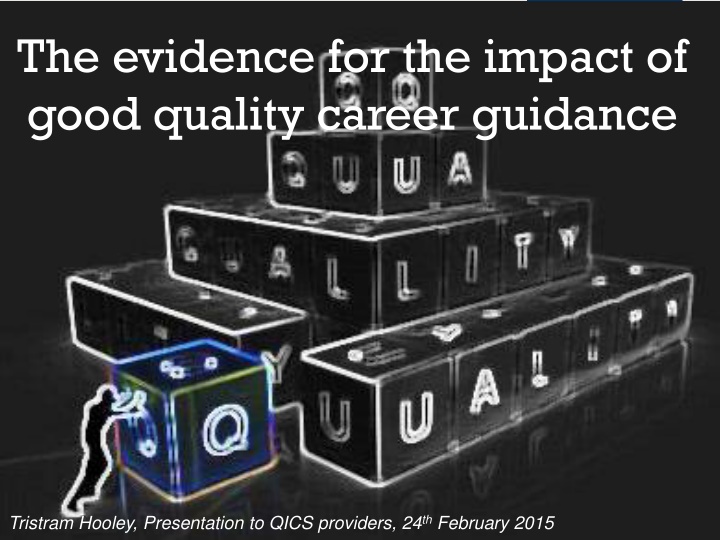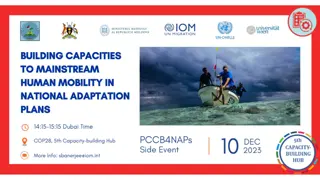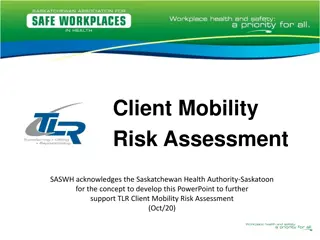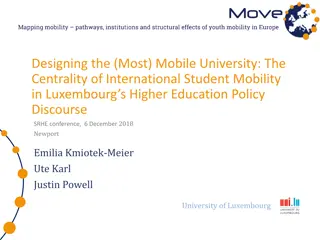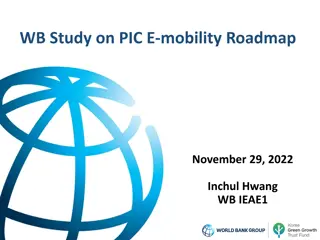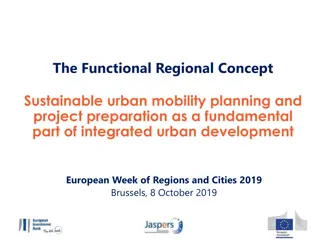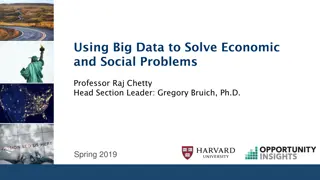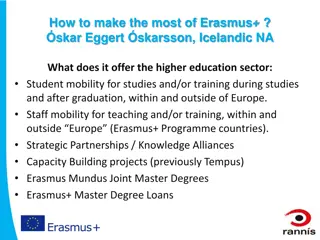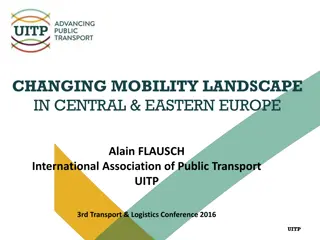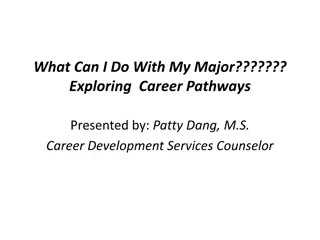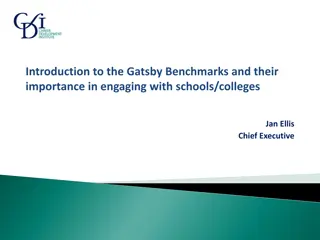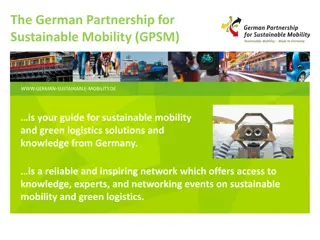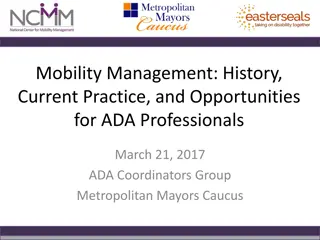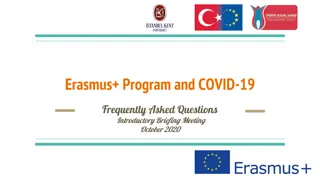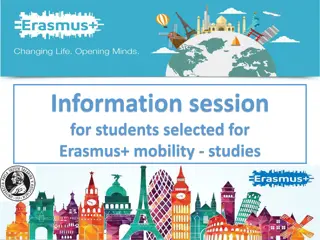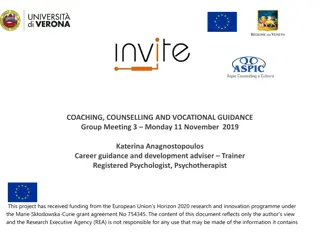Impact of Quality Career Guidance on Social Mobility
In this presentation by Tristram Hooley, the evidence supporting the impact of good quality career guidance on social mobility is explored. The OECD definition of career guidance, benefits of career education, and the elements of good career guidance according to Gatsby's stable careers programme are discussed. The importance of quality guidance throughout one's life, from educational choices to managing careers, is highlighted.
Download Presentation

Please find below an Image/Link to download the presentation.
The content on the website is provided AS IS for your information and personal use only. It may not be sold, licensed, or shared on other websites without obtaining consent from the author.If you encounter any issues during the download, it is possible that the publisher has removed the file from their server.
You are allowed to download the files provided on this website for personal or commercial use, subject to the condition that they are used lawfully. All files are the property of their respective owners.
The content on the website is provided AS IS for your information and personal use only. It may not be sold, licensed, or shared on other websites without obtaining consent from the author.
E N D
Presentation Transcript
The evidence for the impact of good quality career guidance Tristram Hooley, Presentation to QICS providers, 24thFebruary 2015
Overview What makes for quality career guidance? Advancing Ambitions Method Critique of policy The value of career guidance to social mobility Quantifying the impacts What does good look like? Where next? Questions/discussion www.derby.ac.uk www.derby.ac.uk/icegs www.derby.ac.uk/icegs
Overview What makes for quality career guidance? Advancing Ambitions Method Critique of policy The value of career guidance to social mobility Quantifying the impacts What does good look like? Where next? Questions/discussion www.derby.ac.uk www.derby.ac.uk/icegs www.derby.ac.uk/icegs
OECD definition Career guidance refers to services and activities intended to assist individuals, of any age and at any point throughout their lives, to make educational, training and occupational choices and to manage their careers The activities may take place on an individual or group basis, and may be face-to-face or at a distance (including help lines and web-based services). (OECD, 2004) www.derby.ac.uk www.derby.ac.uk/icegs www.derby.ac.uk/icegs
Existing research says Career education and guidance are good things! They are positively associated with a range of benefits including: Retaining young people in the education system (reducing absence and drop out) Increasing attainment Supporting smooth transitions to further learning and work Underpinning lifelong career building www.derby.ac.uk www.derby.ac.uk/icegs www.derby.ac.uk/icegs
The impacts of lifelong guidance www.derby.ac.uk www.derby.ac.uk/icegs www.derby.ac.uk/icegs
Good career guidance (Gatsby) A stable careers programme Learning from career and labour market information Addressing the needs of each pupil Linking curriculum learning to careers Encounters with employers and employees Experiences of workplaces Encounters with further and higher education Personal guidance www.derby.ac.uk www.derby.ac.uk/icegs www.derby.ac.uk/icegs
Overview What makes for quality career guidance? Advancing Ambitions Method Critique of policy The value of career guidance to social mobility Quantifying the impacts What does good look like? Where next? Questions/discussion www.derby.ac.uk www.derby.ac.uk/icegs www.derby.ac.uk/icegs
Method Literature and policy review Identification of a national list of 820 schools that hold QICS awards. Analysis of schools data (including attainment, attendance and destination data) to examine the differences between QICS and non-QICS schools. Detailed case study work with 14 schools that held QICS awards. * Note this is not an evaluation of QICS. QICS was used as a proxy for quality careers provision. www.derby.ac.uk www.derby.ac.uk/icegs www.derby.ac.uk/icegs
Overview What makes for quality career guidance? Advancing Ambitions Method Critique of policy The value of career guidance to social mobility Quantifying the impacts What does good look like? Where next? Questions/discussion www.derby.ac.uk www.derby.ac.uk/icegs www.derby.ac.uk/icegs
Critique of policy The transfer of responsibility for career guidance to schools along with other changes to the career guidance infrastructure from 2011 has resulted in: A decline in the overall quantity of provision A decline in the overall quality of provision An increased patchiness of provision None of these changes has been systematically monitored by government. www.derby.ac.uk www.derby.ac.uk/icegs www.derby.ac.uk/icegs
Overview What makes for quality career guidance? Advancing Ambitions Method Critique of policy The value of career guidance to social mobility Quantifying the impacts What does good look like? Where next? Questions/discussion www.derby.ac.uk www.derby.ac.uk/icegs www.derby.ac.uk/icegs
Career guidances contribution to social mobility Provide access to information and intelligence about the labour and learning markets in ways that transcend existing social networks Demystify labour and learning market systems. Engage with individuals assumptions about themselves and the world around them Listen to individuals aspirations and help them to operationalise these as well as considering alternatives. Build the skills that people need to make decisions and transitions and to progress in their career (career management skills). Broker access to networks. Provide mentoring and support to encourage persistence and remaining resilient in the face of setbacks. www.derby.ac.uk www.derby.ac.uk/icegs www.derby.ac.uk/icegs
Overview What makes for quality career guidance? Advancing Ambitions Method Critique of policy The value of career guidance to social mobility Quantifying the impacts What does good look like? Where next? Questions/discussion www.derby.ac.uk www.derby.ac.uk/icegs www.derby.ac.uk/icegs
Quantifying the impacts At GCSE, good quality career guidance was associated with an improvement in GCSE performance a decrease in persistent unexplained absences. At A-level, good quality career guidance was associated with a decrease in persistent unexplained absences an increase in A-level performance (in state schools and sixth form colleges) improved destinations, with a higher proportion of A-level students destined for top-third higher education institutions and a lower proportion of A-level students with NEET outcomes. www.derby.ac.uk www.derby.ac.uk/icegs www.derby.ac.uk/icegs
Overview What makes for quality career guidance? Advancing Ambitions Method Critique of policy The value of career guidance to social mobility Quantifying the impacts What does good look like? Where next? Questions/discussion www.derby.ac.uk www.derby.ac.uk/icegs www.derby.ac.uk/icegs
What does good look like: Case study findings Infrastructure: buy-in from senior leaders and governors; link to the school mission; dedicated staff or resources; systematic record keeping. Career education programmes Involvement of stakeholders including employers and post-secondary providers Provision of individualised support www.derby.ac.uk www.derby.ac.uk/icegs www.derby.ac.uk/icegs
Overview What makes for quality career guidance? Advancing Ambitions Method Critique of policy The value of career guidance to social mobility Quantifying the impacts What does good look like? Where next? Questions/discussion www.derby.ac.uk www.derby.ac.uk/icegs www.derby.ac.uk/icegs
Where next? Putting quality awards at the heart of career guidance policy? Investment in more detailed evaluation of the quality awards? Repeating this project with more detailed data analysis (student level rather than school level data). Optimising the quality awards and using them as the basis of a RCT. www.derby.ac.uk www.derby.ac.uk/icegs www.derby.ac.uk/icegs
In print Hooley, T., Matheson, J. & Watts, A.G. (2014). Advancing Ambitions: The role of career guidance in supporting social mobility. London: Sutton Trust. Also see Hooley, T. (2012). Progression in Kent: Schools taking charge. Maidstone: Kent Country Council. Hooley, T. (2014). The Evidence Base on Lifelong Guidance. Jyv skyl , Finland: European Lifelong Guidance Policy Network (ELGPN). Hooley, T., Marriott, J. & Sampson, J.P. (2011). Fostering College and Career Readiness: How Career Development Activities in Schools Impact on Graduation Rates and Students' Life Success. Derby: International Centre for Guidance Studies, University of Derby. Hooley, T., Marriott, J., Watts, A.G. and Coiffait, L. (2012). Careers 2020: Options for Future Careers Work in English Schools. London: Pearson. Hooley, T. & Watts, A.G. (2011). Careers Work with Young People: Collapse or Transition? Derby: International Centre for Guidance Studies, University of Derby. Langley, E., Hooley, T., Bertuchi, D. (2014). A Career Postcode Lottery? Local Authority Provision of Youth and Career Support Following the 2011 Education Act. Derby: International Centre for Guidance Studies, University of Derby. www.derby.ac.uk www.derby.ac.uk/icegs www.derby.ac.uk/icegs
In conclusion The evidence gathered through this project suggests that there are some identifiable impacts associated with career guidance. Recent policy has not been evidence based in any way. There is much still to do in developing the evidence base. The quality awards could be an important part of future evidence gathering. www.derby.ac.uk www.derby.ac.uk/icegs www.derby.ac.uk/icegs
Tristram Hooley Professor of Career Education International Centre for Guidance Studies University of Derby http://www.derby.ac.uk/icegs t.hooley@derby.ac.uk @pigironjoe Blog at http://adventuresincareerdevelopment.wordpress.com www.derby.ac.uk www.derby.ac.uk/icegs www.derby.ac.uk/icegs
